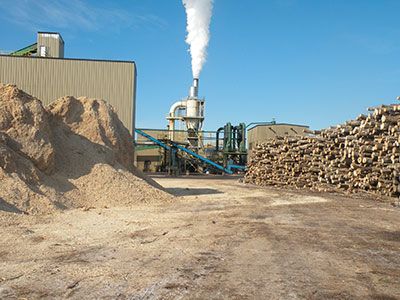
WPAC – A little perspective
October 24, 2013
By Gordon Murray
"Water, water everywhere … nor any drop to drink” The Rime of the Ancient Mariner relates the experiences of a sailor who has returned from a long sea voyage.
"Water, water everywhere … nor any drop to drink” The Rime of the Ancient Mariner relates the experiences of a sailor who has returned from a long sea voyage. The mariner’s tale begins with his ship departing on its journey. Despite initial good fortune, the ship is driven south by a storm. The wind dies and the ship is stranded in a vast ocean. One by one, the crew dies of thirst despite being surrounded by water, leaving the mariner as the only survivor. Finally – near death – he is rescued.
 |
|
| For sustained growth, B.C. pellet mills need access to underutilized fibre like harvest slash.
|
This story brings to mind the current plight of the British Columbia wood pellet industry. As I pointed out in my July-August column, the problem is that despite giving us repeated assurances since 2008, the B.C. government, in its role as landlord over the province’s public forests, has still not delivered any meaningful way for pellet producers to obtain fibre supply security.
One easy way for the B.C. government to increase fibre supply for the wood pellet sector would be to ban slash burning across the province, similar to the way in which it banned the use of sawmill waste-wood beehive burners beginning in 1995. Presently, B.C.’s Forest Act does not provide mandatory utilization standards for primary forest tenure holders. The government allows the province’s lumber industry to harvest public forests, remove only the best timber and burn the rest – some 9.3 million dry tonnes annually (Table 1) – charging lumber producers nominal or zero stumpage for whatever timber they choose to waste. The amount of wood fibre being burned and wasted by B.C.’s lumber industry is six times greater than the total annual production of B.C.’s wood pellet industry. It is a common experience for pellet producers to reach out to B.C.’s lumber producers in an attempt to obtain access to leftover low-grade logs, branches and tops, only to find that those lumber producers prefer to burn this material rather than allow the pellet industry to have access to it. This is an egregious waste of a precious public resource that the B.C. Government should be preventing.
Particulate emissions from open burning are a serious health hazard, especially for B.C.’s children. According to Dr. Michael Brauer, a professor in the Faculty of Medicine at the University of British Columbia, particulate emissions from wood smoke cause a 32 per cent increase in middle ear infections and is the top reason for children under the age of two years to see a physician and be prescribed antibiotics. And wood smoke particulates cause an eight per cent increase in bronchitis in children and is the number 1 reason for children under the age of one year to be hospitalized. Even the B.C. government, in its 2008 Air Action Plan, acknowledges the dangers of particulate emissions by stating, “PM [particulate matter] is a serious health concern, as it can cause diseases such as emphysema, chronic bronchitis, asthma and lung cancer. Because PM is composed of tiny particles invisible to the human eye, it can be inhaled deeply into our lungs.”
According to the Air Action Plan, slash burning is the number one source of B.C. particulate emissions, accounting for 32 per cent of all particulates in the province. This means that by banning slash burning in the province the B.C. government could not only provide a reliable source of fibre for B.C.’s pellet industry, but also dramatically reduce B.C.’s air pollution and in so doing, protect our childrens’ health.
Like the ancient mariner staring at a sea of undrinkable water, the pellet industry watches the BC lumber industry burn our forests. The government could easily stop this waste of our forests by banning slash burning and compelling tenure holders to utilize wood waste – either internally or by selling it to those who could use it. •
Gordon Murray is executive director of the Wood Pellet Association of Canada. He encourages all those who want to support and benefit from the growth of the Canadian wood pellet industry to join. Gordon welcomes all comments and can be contacted by telephone at 250-837-8821 or by e-mail at gord@pellet.org.
Print this page